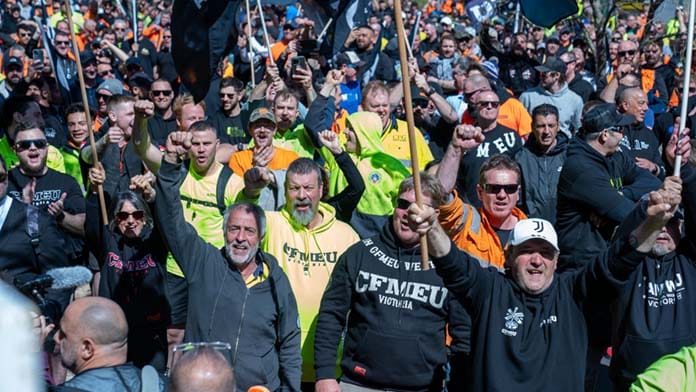CFMEU members in NSW are set to strike on 12 November in protest at the Albanese government placing the CFMEU into administration.
It is a very welcome move to keep up the industrial campaign. But it is clear that the Building Industry Group of unions’ legal campaign is overshadowing the industrial fight.
Despite widespread support among the rank-and-file who are outraged at Labor’s takeover of the union, suggestions of a 72-hour strike in Victoria and a possible national strike on 30 October unfortunately came to nothing.
Now blue-collar unions, including the CFMEU, CEPU, plumbers and the MUA, are set to meet in Canberra on 9 December to hold a “Trade Unions for Democracy Summit” to discuss forming a breakaway union federation as an alternative to the ACTU.
The meeting coincides with the 10 December opening of the High Court action challenging the legality of Labor’s administration regime that has strait-jacketed the CFMEU and removed officials from their elected positions.
The summit will also consider running “union political candidates” in the federal election against Labor.
There is widespread anger at the ACTU’s collaboration with Labor’s attack on the CFMEU. But it is not clear what an “alternative to the ACTU” would actually look like. It will be challenging, but there are good reasons to keep fighting inside the ACTU to win more unions to opposing administration.
What’s needed is not just opposition to the ACTU and administration but a strategy based on militant industrial action, and a willingness to defy anti-strike laws to defend union organisation and end administration.
CFMEU officials are putting too much emphasis on the High Court challenge. This is a big mistake. The chances of winning in court are slim. And the government has already made it clear it will simply change the law again if the case succeeds.
A rally has been called for Canberra on 10 December, when the High Court hearing starts. This needs to be nationwide stopwork action.
The two national construction stopwork rallies in August and September rattled the government.
But the administrator and the government are just biding their time. The administrator stopped ACT CFMEU acting secretary Michael Hiscox from speaking to the media before the ACT election that Labor won in October.
Industrial Relations Minister Murray Watt has said, “It’s still pretty early days in this administration process” that will run for “a minimum” of three years.
Watt is putting together a blueprint for construction industry reform in collaboration with construction bosses and compliant unions through the National Construction Industry Forum.
The Fair Work Ombudsman is also trawling for information to bring charges for coercion against union delegates and officials, announcing that it has 42 new investigations into the CFMEU running.
In Victoria, after unions secured a written assurance from the state’s construction bosses association Master Builders Victoria that it supports the CFMEU EBA, the threatened three-day strike was called off.
But the Fair Work Commission is stalling on ratifying the agreements, looking for any evidence of union “coercion” to force employers into signing. The construction unions need to make it clear that if it starts rejecting agreements or continues to delay them, there will be a fight.
Victoria’s rank-and-file Defend the CFMEU committee has argued for empowering delegates to hold site meetings to discuss industrial action aimed at ensuring building companies sign the EBA. Action targeting individual companies, backed if necessary by industry-wide strikes, is needed.
Bosses’ agenda
The construction bosses’ agenda is clear. It is only a matter of time before they begin more serious attacks. Already there are indications that safety standards on sites are being ignored.
A letter from four construction employer organisations to Murray Watt, Minister for Employment, has exposed the real agenda behind the attack on the CFMEU.
In it, the employers thank Labor for putting the construction division of the union into administration—but make it clear that they want blood.
They call on the government to ban five clauses they object to from enterprise bargaining agreements. These include an attack on conditions by outlawing any union say over the “selection and use of contractors or mandate consultation about the use of such contractors”.
They also want an end to clauses that require all subcontractors to be “engaged on terms no less favourable than the terms of the Head Contractor” (known as “jump-up” clauses).
The bosses are out to smash the “business as usual” approach to enterprise bargaining and weaken the union, and Labor is helping them.
The discussion we need at the 9 December summit, and on every job, is about how we mobilise the real industrial power that workers have to beat Labor and the bosses.
By James Supple






